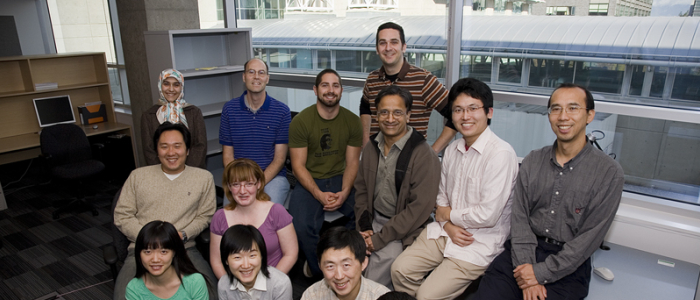
Research Groups
The department has 24 research groups and coalitions that fall under 5 broad categories. A link to each group's website and member profiles are listed below.

The department has 24 research groups and coalitions that fall under 5 broad categories. A link to each group's website and member profiles are listed below.
We aim to build a research training program in machine learning with value-added training opportunities beyond what traditional computer science programs provide, and linking students to a global network of world-leading researchers and institutions in the field. Our long-term goal is to support the growing digital tech ecosystems in western Canada and beyond.
Artificial Intelligence at UBC focuses on decision-making and action, particularly on the design and application of AI systems that cooperate with human decision-makers. This AI research group and the breadth of its work is establishing UBC as leaders in sub-areas like privacy.
CAIDA is UBC's research hub for artificial intelligence, belonging to the Institute for Computing, Information and Cognitive Systems (ICICS). The expertise of its nearly 100 researchers, who span many academic units, ranges from theoretical to applied, enabled by technologies like machine learning and automated reasoning.
The Computer Vision Lab group began as a part of the Laboratory for Computational Vision, which is well-known for creating and developing robot soccer and SIFT features. Today, we develop algorithms in the areas of image understanding, video understanding, multi-modal (vision + language) modeling, 3D computer vision, human pose estimation, and the use of large generative models for computer vision applications.
Our long term vision is to create ethical AI systems that humans can trust and collaborate with. Our major research areas are user-adaptive visualization, interfaces for decision support, multimedia interactive visualizations for opinion mining, and adaptivity in unstructured and open-ended interfaces.
Machine learning and its applications have been on the rise in recent years, with UBC faculty members from the Departments of Computer Science, Statistics and Mathematics at the Faculty of Science, and the Faculty of Applied Sciences at UBC leading several efforts in this area.
MILD is a cross-departmental group working on rigorous mathematics related to machine learning and data. We aim to add theoretical foundations currently lacking in this domain across topics like differential privacy, algorithm design, information theory, learning theory, probability theory and mathematical statistics.
The Natural Language Processing Group conducts research in Computational Linguistics, Text Mining, Machine Learning, and Visual Text Analytics.
This group works in collaboration with partners from across industry and academia to develop production-quality, open-source software with applications in computational neuroscience, image recognition, robotics and AI.
The DFP cluster, which spans many academic units, addresses complex human-facing design problems by accelerating creativity at the nexus of social and technical problem-solving.
This group focuses on designing interactive technologies that can be personalized to the needs of individual users. They use a range of methodologies from rich qualitative fieldwork to tightly controlled quantitative experiments, using a very human-centred approach.
InfoVis focuses on developing visual representations and interaction techniques to take advantage of the human eye’s broad entry into the mind to allow users to see, explore, and understand large amounts of information at once.
This lab is inter-disciplinary, with members working together to advance the science of computer graphics, computer animation, visualization, haptics, and human computer interaction.
The lab researches human movement and develops advanced computational models through computer graphics, scientific computing, computational mechanics, robotics, biomechanics, and the neural control of movement.
SPIN is an interdisciplinary group of researchers who design and build innovative physical, touch-based user interactions to solve or advance real human issues.
SOCIUS focuses on enriching computer-mediated social interactions by aligning technology design with human social processes, creating more inclusive and humane user systems through novel design interventions.
The ISD group is interested in principles, techniques, methodologies, and tools for the specification, design, implementation, and verification of protocols, circuits, and integrated hardware/software systems.
This lab is a collection of researchers who want to more efficiently and effectively build better software systems.
The data management and mining lab focuses on how to manage or mine data, relational or otherwise. This lab focuses on topics such as data understanding and exploration, health data analysis, social networks , and web and graph databases.
The institute spans the Faculty of Science, equipping researchers and external partners in the data science community with the approaches, tools and expertise they need to fully leverage the potential of big data.
The security & privacy group works on a wide range of topics including systems security, cloud security, privacy, ML, and software engineering.
We conduct research on a variety of topics, including operating systems, distributed systems, security, data provenance, program analysis, privacy, interpretable machine learning and much more!
This area conducts research in areas like molecular computation, empirical algorithm design, algorithmic game theory, optimization and theoretical computer science.
In this lab, researchers develop fast, reliable, and robust numerical algorithms needed for modeling and simulation in many fields, like physics, engineering, life sciences, and data science. Research areas include numerical linear algebra, optimization, numerical solution of partial differential equations, and applications of scientific computing.